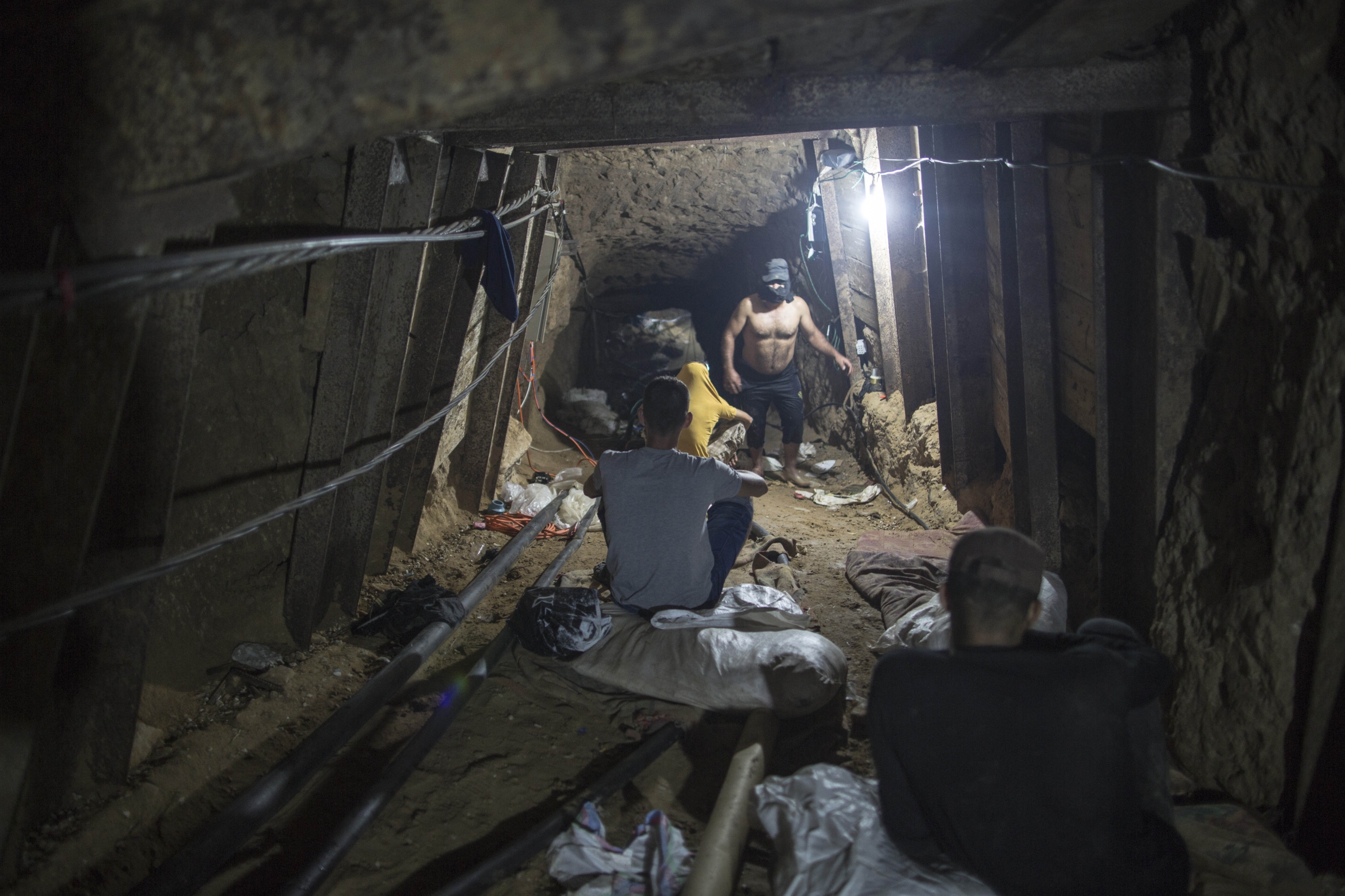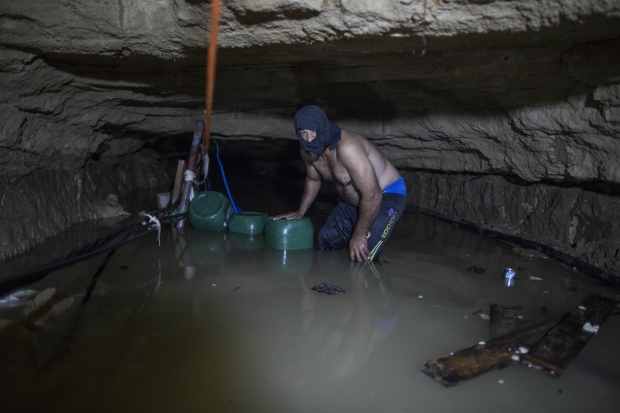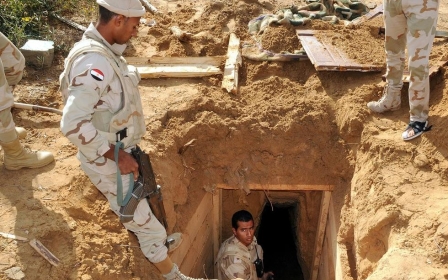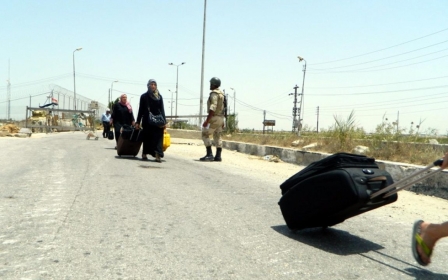Why do some Gazans choose to work 35 metres underground?

The Egyptian authorities have waged a tireless war to try and root out tunnels that stretch from the Gaza Strip. They have flooded them, tried to blow them up and all but levelled the border town of Rafah in an attempt to stop the smuggling trade.
As the restrictions on the Egyptian side have increased, Gazans have found themselves further running out of key supplies. According to UNRWA, the price of basic commodities has started to rise while already scant job opportunities have dwindled further.
Backed into a corner, some in Gaza have decided that they have no options left but to keep trying their luck in tunnels that have become more dangerous than ever before.
Anas, 27, is one of those workers putting their lives in danger and descending up to 35 metres underground in order to pull water out of a tunnel, which is then used to smuggle essential commodities from Egypt into Gaza.
When the Egyptian army started its “war” on the tunnels in mid-2013 following the toppling of former President Mohammed Morsi, Anas lost his job.
“I started to spend my savings on my three-member family until they ran out. Then I called one of my old friends and asked for work, any work,” Anas told MEE.
“My friend told me that there is a chance to work, but he warned that it was a difficult, scary and dangerous job.
“Without thinking, I agreed and told my friend that I wanted to start the new job as soon as possible. I had no money and my savings had run out. Immediately, my friend replied: I am coming to visit you tonight,” Anas added.
At about 11:00 pm, when it was completely dark and there was no one in the streets, someone knocked on his door and asked for him. When Anas opened the door he was very surprised to see one of the most famous owners of the tunnels burst into his home.
He said that the notorious smuggler sat down and made his introductions and that it wasn’t long before the pair started talking about the tunnels and the dangers involved in working in them.
Anas’ new job regularly requires him to descend up to 35 metres underground and work inside a tunnel full of water. Possibilities that the tunnel will collapse are very high.
The local Maan news agency said that Hamas had counted 160 deaths between 2007 and 2012. By August last year, Al Jazeera claimed the death toll was as high as 400. Reports of further casualties periodically pile up and two weeks ago the Palestinian Civil Service in Gaza announced that three Palestinian workers were missing inside a tunnel, which had been blown up by the Egyptian army.
Within months of Morsi’s overthrow, the UN said that said 80 percent of Gaza's tunnels had been wiped out and the stream of goods – from car parts to zoo animals – heavily curtailed.
The Egyptian army largely began by blowing up the exits, but they have since started flooding the tunnels. A couple of weeks ago, the army said that it planned to pump water in from the Mediterranean in order to further tighten the siege which has been in place since 2007 when Hamas swept their main rival, Fatah, out of the coastal enclave and took control. Israel and Egypt both insist that the blockade is necessary to weaken Hamas and prevent them smuggling in weapons, but Gazan civilians have often been left paying the heaviest price.
No one can give an exact number how many tunnels existed before they were destroyed by the Egyptian army. Some organisations estimated the number at 500 while some put that number at more than 800.
Palestinian rights groups, as well as Palestinian factions, have called on Egypt to stop flooding Gaza's borders with sea water, but Egypt has insisted that this is a matter of national security.
No one seems to be fully immune. Anas’s new employer, who spoke to MEE on condition of anonymity and would only allow himself to be identified as Abu-Latif.
“It was not so difficult to let people know everything about you before 2013,” he said. “Since then, we are scared of what the Egyptians might do."
“But their fierce war on the tunnels makes me feel that I am putting myself in danger because I am determined to fortify my tunnel.”
When asked why he insists on working in the tunnels despite the security danger and unsafe work conditions, Abu-Latif said, “There are 40 workers here and all of them, including me want to get money to feed our families. There is no other work to do at the moment.”
Abu-Latif, who was a prominent tunnel businessman until August 2013, said he had lost four workers during that time. He did not pay any compensation to the families he said because there is no insurance in his line of work.
But desperate families are often willing to try anything and there are scores of former tunnel workers who would jump at the chance to get back to work.
“My four sons, three daughters, sick wife and me have been living in really difficult conditions since mid-2013, when I lost my job in the smuggling tunnels,” said Ahmed Wadi, 51, who spends all day sitting with neighbours and friends gossiping at the doorstep of his house.
Wadi worked for four years in the smuggling tunnels.
“I used to earn between 150 to 200 shekels ($40 to $60) per day from my work in the tunnels and my life with my family was OK,” Wadi said. “I paid for six university semesters for my eldest daughter... but when I stopped working, I could not pay for the last remaining two semesters.”
“Our life has become very difficult. Allah alone knows how I manage to find enough money for bread and other simple things to eat. My two young sons are also working now, but our life is still really difficult,” he added.
A World Bank report issued in May stated that 40 percent of Palestinians in the Gaza Strip fall under the poverty line.
“Gaza’s unemployment and poverty figures are very troubling and the economic outlook is worrying. The current market in Gaza is not able to offer jobs, leaving a large population in despair, particularly the youth,” said Steen Lau Jorgensen, World Bank Country Director for the West Bank and Gaza.
“The ongoing blockade and the 2014 war [with Israel] have taken a toll on Gaza’s economy and people's livelihoods. Gaza’s exports virtually disappeared and the manufacturing sector has shrunk by as much as 60 percent. The economy cannot survive without being connected to the outside world.”
Wael Wadi, Ahmed’s son, has now been forced to leave school in 2014 because his father could not buy him a new school uniform. “At the beginning, I started collecting plastic with my brother Tamer from the streets and sold it until we had enough money to buy a donkey with its cart,” Wael said.
“Then, I told my brother to return to school and I [decided that I] will work alone and get money for his school kits and the family needs,” Wael told MEE. “I make about 20 to 25 shekels ($5 to $6) a day. At first, I buy food for the donkey, then, I give the remaining money to my father to see what he can do for the family.”
Wael said he hoped to return to school, but added: “Who will work for the family? Where will my family get their needs? How will my brother Tamer buy a new school uniform? What will we eat if I don't earn money for food?
“I have never liked this. I wish to go to school and spend summer holidays playing with my brothers and sisters on the beach like other children. That was our life before, but the siege and the closure of the tunnels brought it to this.”
Middle East Eye propose une couverture et une analyse indépendantes et incomparables du Moyen-Orient, de l’Afrique du Nord et d’autres régions du monde. Pour en savoir plus sur la reprise de ce contenu et les frais qui s’appliquent, veuillez remplir ce formulaire [en anglais]. Pour en savoir plus sur MEE, cliquez ici [en anglais].





